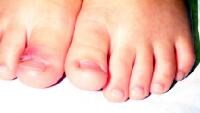 Are fallen arches a real foot problem, or just a label for chronically sore feet?
Are fallen arches a real foot problem, or just a label for chronically sore feet?Fallen arches --or flat feet-- are a legitimate medical condition affecting five percent of Americans.
Flat feet can be present at birth, or develop over decades of walking, running and overall time spent on the feet, especially on hard surfaces in the workplace.
There are several types of flatfoot conditions that occur in adults. The most common type is adult-acquired flatfoot. It is caused by overstretching a tendon that supports the arch. Another common type is flexible flatfoot, in which the foot is flat when standing, but returns to a normal arch in non-weight-bearing positions.
Flat feet can be very painful and make people avoid walking, running and exercise, but if you seek medical attention early, a foot and ankle surgeon may be able to prevent it from becoming a more serious foot problem.
Treatments for this condition may include modification of limiting activities, stretching exercises, custom shoe inserts and non-steroidal anti-inflammatory medications. If those techniques don't work a variety of surgical procedures may be considered to relieve pain and improve foot function.
For more information about flatfoot treatment or other painful foot conditions, please call the office, 440-946-5858, for more information or a consultation.



